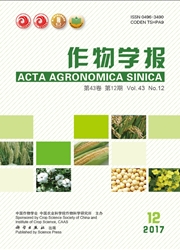

 中文摘要:
中文摘要:
系统研究了蜂毒肽对玉米、番茄、大豆、大白菜等农作物生长发育过程中生理指标的影响及对玉米防御系统酶的作用。结果表明.蜂毒肽对农作物的影响具有普遍性,对细胞中的叶绿素、可溶性糖、核酸及蛋白质含量,低浓度有一定促进作用,高浓度有抑制作用。但影响都很微弱(t检验P〉0.05)。蜂毒肽对植物防御系统酶具有诱导效应,5mg/L蜂毒肽使其活性快速增加,其中PAL、PPO在喷药后48h达到峰值,分别比对照提高178%和9.8%;而SOD在6h即可达到峰值,比对照提高31.5%;只有POD在喷洒50mg/L蜂毒肽后48h达到最大值。玉米POD同工酶谱的研究进一步表明蜂毒肽对有的酶谱带(品种1的P11谱带)有很强的诱导作用,有的甚至诱导出1条新带(品种2的P4谱带);而对有的谱带有抑制作用,而且对不同品种POD酶的作用不尽相同,但喷药后2个品种POD酶总体含量均高于对照,与酶活测定结果相同。
 英文摘要:
英文摘要:
The content levels of chlorophyll, soluble sugar, nucleic acid and protein of four crops (maize, tomato, soybean and Chinese cabbage) were promoted by the low concentration(5 mg/L) of melittin, and inhibited by the higher (50 mg/L) one, although the effects were not significant( t-test, P 〉 0.05)in four crops. Their PAL and PPO activities were reached the maximal levels 48 hours after spraying the solution of melittin (5 mg/L), which were increased by 178% and 9.8% respectively as compared with the control, while the activity of SOD was increased by 31.5 % after 6 hours. The activity of POD was reached the maximal levels under the treatment of 50 mg/L melittin. The land pattern of POD isoenzyme in maize elucidated further that there were strong induction to some zymogram bands(egP11 )while inhibition to others, and different effects on the different cultivars showing the particularity of cuhivars.
 同期刊论文项目
同期刊论文项目
 同项目期刊论文
同项目期刊论文
 期刊信息
期刊信息
